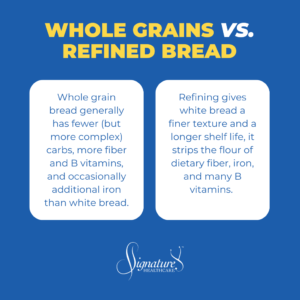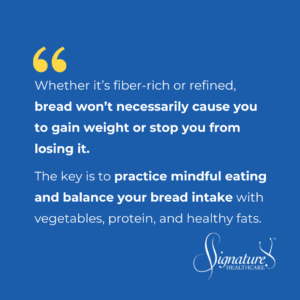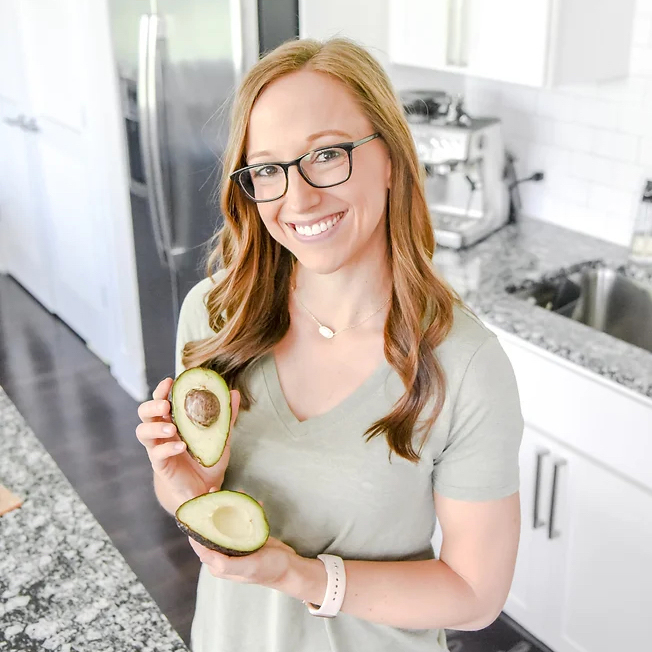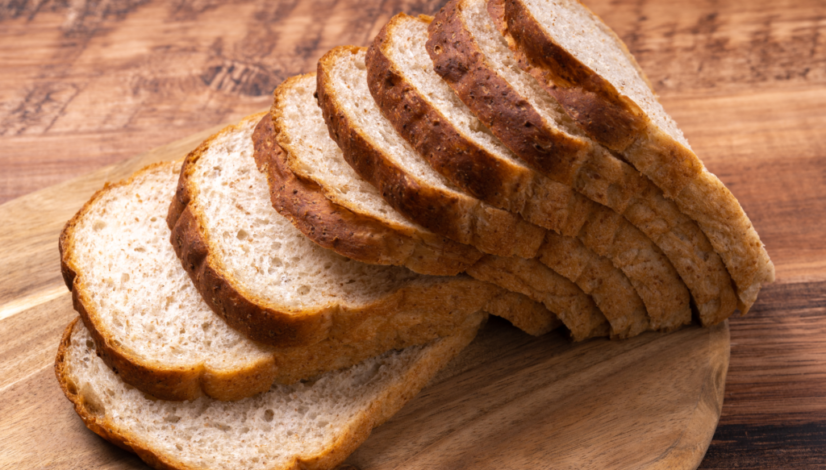Is Bread Really Bad for You? A Look at Whole Grains vs. Refined Bread
Bread has been a food staple for centuries. In Jordan, archaeologists unearthed a 14,000-year-old scrap of bread, proving that people baked bread before it was even thought possible.
Much of the world’s population still eats bread at every meal, believing it’s essential to both daily wellness and longevity. But today, we also ask more questions about the bread we eat.
Most breads contain useful carbohydrates, but many modern diets caution against them. So, people ask, Does bread cause weight gain? What else is in it? What are its benefits? Some even wonder, Is bread bad for you?
Let’s look a little deeper, breaking down the differences between whole grain bread and refined white bread.

Whole Grain Bread
Whole grain bread generally has fewer (but more complex) carbs, more fiber and B vitamins, and occasionally additional iron than white bread.
- Fiber in whole grain bread delivers a feeling of fullness and lowers blood sugar, helping with weight loss. It improves digestive system health and encourages bowel regularity (linked to a lower incidence of colorectal cancers). And it lowers cholesterol for better heart health.
- Whole grain foods are good sources of vitamin B1 (thiamine), B2 (riboflavin), B3 (niacin), B6 (pyridoxine), and B9 (folate). B vitamins help the body to use energy from food and create new cells.
- Iron in whole grain bread helps transport oxygen in the blood and supports muscle metabolism.
For these reasons, two to three daily servings of whole grains can play an important role in a balanced diet.
Refined White Bread
White bread contains refined grains. These grains are milled through a process that removes bran and germ.
Although refining gives white bread a finer texture and a longer shelf life, it strips the flour of dietary fiber, iron, and many B vitamins. After refining, the bread is typically enriched to replace several lost nutrients. However, the restored nutrients are less natural.
This refined flour is also high in simple carbohydrates. Eating white bread increases your blood sugar more rapidly than with whole grain bread.
The complex carbs in whole grain flour are healthier for your insulin response. You digest them more slowly, so you experience a more gradual increase in blood sugar.
No “Naked” Carbs
It’s a common misconception that bread causes you to hold onto excess pounds. But whether it’s fiber-rich or refined, bread won’t necessarily cause you to gain weight or stop you from losing it.
The key is to practice mindful eating, be intentional about portions, and balance your bread intake with vegetables, protein, and healthy fats.
A basic rule: Think “no naked carbs.” In other words, don’t eat your bread or toast solo (this goes for other simple carbs like fruit, too).
When consumed alone, carbohydrates can cause a quick elevation in blood sugar. But bread paired with a protein and healthy fat — for example, toast topped with a nut butter or mashed avocado and egg — slows carb absorption and helps regulate blood sugar.

When You Shop for Bread
“Sprouted,” “low carb,” “multigrain.” With so many labels fighting for your attention in the bread aisle, how do you choose the loaf that’s best for you and your family?
Carefully check ingredients when you shop:
- Look for high fiber with 100% whole grain or 100% whole wheat flour as the first ingredient.
- Ideally, the loaf contains minimal other ingredients. You may need to refrigerate it; however, with fewer ingredients, it’ll taste fresher and less processed.
- Be sure the bread contains low or no added sugar or low sodium if your diet requires it.
- Remember that “enriched” on a label means refined flour: Key nutrients were extracted and re-added later in the process.
Do you have celiac disease, or are you gluten-sensitive?
People with a gluten sensitivity may be more likely to tolerate sourdough breads. Sourdough’s fermentation process naturally breaks down gluten, leaving less in the finished product.
However, individuals with celiac disease or a wheat allergy require gluten-free bread alternatives made with rice or sorghum flour.
Here are a few brands of healthier breads you can find in the Charlotte area:
- Dave’s Killer Bread varieties are high in fiber; some are low in added sugar as well.
- Food For Life brand’s Ezekiel sprouted grain bread is a very wholesome option found in the freezer section of some grocery stores. Sprouted breads have more nutrients and are easier to digest than breads made from unsprouted grains.
- A personal favorite of mine, recommended by a patient, is genuine slow-leavened sourdough from Team Rose Bread, a family bakery located here in Charlotte. It’s a privilege to support a local business while enjoying their delicious, healthy breads!
- If you need gluten-free breads, The Accidental Baker is a relatively new gluten-free bakery local to Charlotte.
Ask Us About Bread
At Signature Healthcare, we regularly address questions like “Is bread bad for you?” or “What kind of bread makes sense in my diet?” We offer patients nutritional guidance, dietary analysis, and counseling on sustainable healthy eating habits.
And we love bread. No matter how you slice it, we’ll help you factor it into a well-balanced daily menu. Contact us for a consultation!

Natalie Mokari, RDN LDN
Natalie Mokari is a skilled dietitian with a Bachelor of Science in Food Science and Human Nutrition from Clemson University, complemented by a dietetic internship in Charlotte. Her expertise spans outpatient clinical nutrition, private counseling, corporate wellness, and school food service, emphasizing a non-diet approach and mindful eating. Outside the clinic, she relishes trying new recipes, outdoor activities, traveling, and exploring Charlotte with her husband and dog.

